| Reviews & Columns |
|
Reviews DVD TV on DVD Blu-ray 4K UHD International DVDs In Theaters Reviews by Studio Video Games Features Collector Series DVDs Easter Egg Database Interviews DVD Talk Radio Feature Articles Columns Anime Talk DVD Savant Horror DVDs The M.O.D. Squad Art House HD Talk Silent DVD
|
DVD Talk Forum |
|
|
| Resources |
|
DVD Price Search Customer Service #'s RCE Info Links |
|
Columns
|
|
|
Dark Skies: The Declassified Complete Series
"The truth is overrated."
Of course...now disco makes sense. Shout! Factory has outdone itself with Dark Skies: The Declassified Complete Series, a six-disc, 19-episode collection of Dark Skies, the one-off NBC cult sci-fi series from 1996. A deliriously paranoid goof that weaves an ever-expanding net of half-truths, suspicions, and outrageous conjecture over historical events such as the Kennedy assassination, Vietnam and the Watts riots, Dark Skies' proposition that our "true" history of the last 60+ years is underwritten by a super-secret government battle against an invading alien force, is music to my conspiracy-lovin' ears. Shout! goes all out here with a snappily-designed box set that includes hours and hours of extras for the still-loyal fan base of this too-quickly canceled gem. It's one of the best vintage TV releases so far this year.
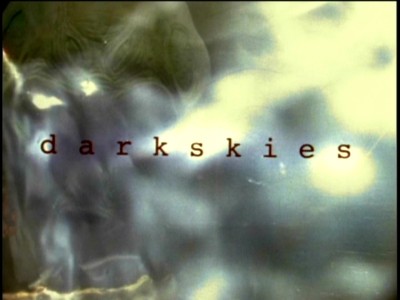
The set-up. Camelot, 1961. Young, fresh-faced Congressional aide John Loengard (Eric Close) has arrived in Washington, D.C. with his pretty fiancé, Kim Sayers (Megan Ward), an equally ambitious college graduate who eventually secures a job working for Mrs. Kennedy at the White House. John, underutilized as an office gofer, presses his supervisor to give him more responsibility, and he's subsequently rewarded with a new title: Congressional investigator. Assigned to look into possible programs that his Congressman boss could safely cut for the upcoming budget, John is given the task of looking into "Project: Bluebook," the government's public front for investigating UFO sightings. A skeptic when it comes to "flying saucers," John interviews Betty and Barney Hill (Lee Garlington and Basil Wallace), and after hearing their sobering tale of abduction, begins to think twice about recommending "Project: Bluebook"'s defunding. However, a terrifying nighttime visit by black ops Naval officers, led by Captain Frank Bach (J.T. Walsh), sends a different message to John: defund "Bluebook" and forget everything about flying saucers...or lose your life. John, the incarnation of JFK's "New Frontier" spirit of openness in government (hee hee), decides to track down Bach's history, discovering the mysterious operative had connections to the infamous 1947 Roswell, New Mexico incident. Threatening to expose Bach, John is taken to the ultra-covert "Majestic-12" headquarters, and shown the secret of the ages: the frozen corpse of a "Gray," an alien visitor who crashed at Roswell. History as John knows it, is now a lie, and very soon, he'll see how cataclysmic events in recent American history, given a safe spin for the public, are in fact the ripple effects of this first visitation of alien life forms, and Majestic's fight against them. From that moment on, John, and soon Kim, will be drawn into a waking nightmare world where Majestic battles the secret alien invasion for the very soul of the planet, with Kim paying a particularly high cost for her involvement.
MAJOR SPOILERS ALERT!
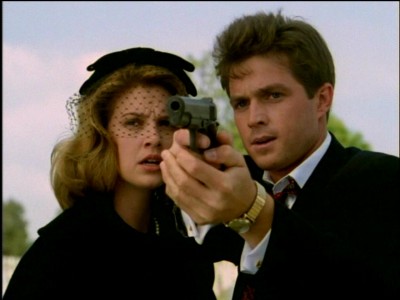
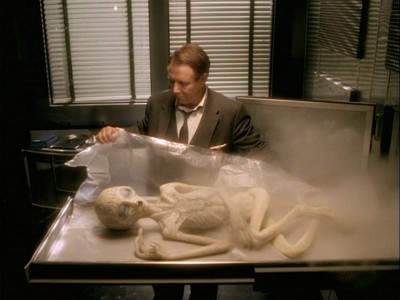
I deliberately left the above synopsis vague, because I didn't want to give away too much for those readers who just want the general drift of the series. However, it's next-to-impossible to discuss Dark Skies in any depth without revealing some of its fun secrets, so if you haven't seen the show, and you don't want it ruined for you, I recommend you stop reading, skip down to the A/V recommendations for a peek at the extras, and buy Dark Skies. Otherwise...you were warned....
As anyone who's read some of my previous reviews knows, I've always been upfront in admitting I love conspiracy theories and alternate histories (the crazier, the better), having grown up in the golden age of such musings during the 70s (I have posters for every Schick Sunn Classic movie made, pal), and that I'm fairly open-minded about UFO sightings (I haven't seen one yet...but a lot of credible people claim to have). So I'm coming to Dark Skies fairly receptive to its message. I watched a few episodes of the series back in '96 when it ran, rather erratically, on NBC, remembering best the gory, disgusting "cerebral eviction" sequences, where the "Ganglion" parasites were ripped out of people's heads, or coughed up like particularly troublesome hair balls.
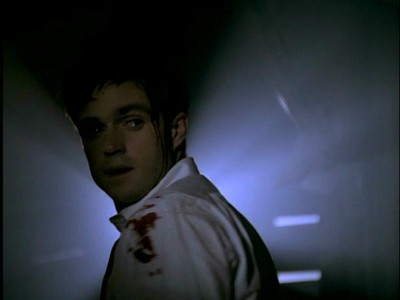
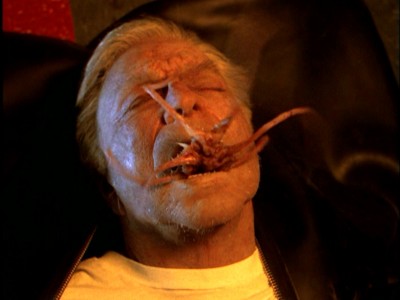
Watching Dark Skies from beginning to end here, it's a particular treat to see how well creators/writers Bryce Zabel and Brent V. Friedman cleverly created a framework where anything that happened in our history could easily be plugged into this epic struggle between "The Hive" and Majestic-12. Creating a sort of "unified theory" application of many of the alien and abduction theories out there, along with all the serious-to-screwy conspiracy theories about events like JFK's assassination and Vietnam woven in as the results of this battle, Zabel and Friedman weren't content just to say aliens are here and they're trying to take us over. Building layer upon layer of their subtext, they first create the novel twist of having the "Grays" we're all so familiar with (the aliens with the big head and eyes) be revealed as not our conquerors, but slaves themselves, infected with the hideous "Ganglion" who directed the Grays to visit, threatening Earth with destruction if President Truman didn't unconditionally surrender at Roswell―prompting the U.S. Army to blast their saucer out of the skies (a cool addition to the Roswell mythology). From there, Zabel and Friedman go one step further and complicate the relationship between Majestic and the rest of the U.S. government, showing how Majestic's overreaching independence makes it almost impervious to outside control, oversight represented by "truth-teller" John, who insists his mission is to honor JFK's spirit, and reveal all to the American public―not just the presence of the Hive and the Grays, but also Majestic's sometimes nefarious practices.
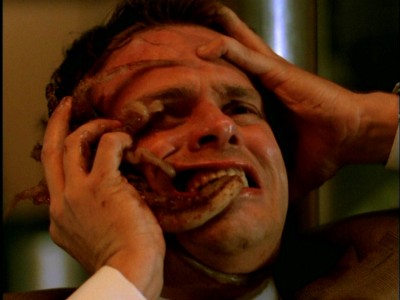
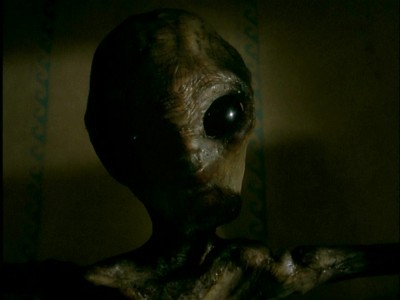
Within that framework, then, any historical event can be simply plugged into the Hive conspiracy without difficulty...and with increasing paranoia. A good example of this comes in To Prey in Darkness, where the suspicious death of columnist Dorothy Kilgallen is connected up with the great Eastern seaboard blackout of 1965, both of which Dark Skies says were engineered to cover up the theft of stolen film footage from the Battle of Roswell. Dark Skies is littered with these kinds of speculative connections, delighting the viewer with "spot the historical reference or character" moments while we marvel at how neatly they're worked into the Hive/Majestic battle for supremacy (what other show could believably work in such diverse historical events as the Beatles's first U.S. concert, Howard Hughes' obsession with Communism, and Colin Powell's early military career (!) under a crazily believable umbrella concerned with aliens taking over the world?). Even better are the fun, unsettling associations created in the viewer when this Hive/Majestic theory is grafted onto iconic historical events. A good example comes in We Shall Overcome, which centers around the disappearance of three civil rights volunteers in Meridian, Mississippi during 1964's "Freedom Summer," when we're asked not only to feel (kind of) sorry for J. Edgar Hoover (!) when he's blackmailed by Majestic over his sexuality, but also when we're presented with the sight of a supposedly-benevolent Black preacher nursing Ganglion babies as the head of the local Hive...in the basement of his church (when he frightens the recalcitrant white racist, showing who's really in charge around those parts, it's a deliciously perverse moment).
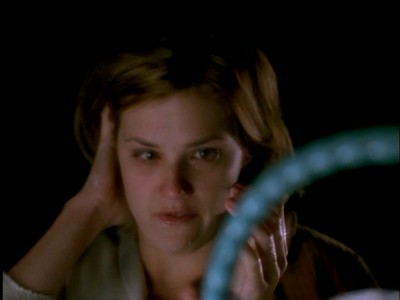
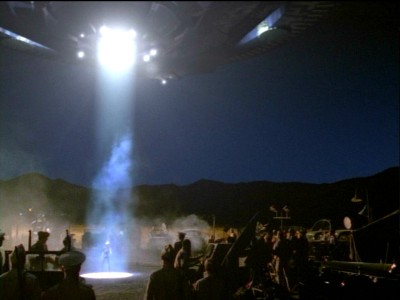
Listening to the two commentary tracks included here, featuring the producers as well as the two lead actors, Zabel and Friedman postulate that a bad time slot and unforgiving The X-Files supporters doomed Dark Skies from the start―certainly two valid factors in the show's one-season run. Airing at the single-most "family friendly" time slot on the networks' schedules―Saturday nights at 8:00pm―it's difficult to comprehend what NBC was thinking, putting on a show at that slot that showed slimy, Alien-like spiders being ripped out of people's skulls, or slithering out of their mouths (when I watched it back in '96, I remember hustling the kids out of the room pronto; nobody was going to find any "cerebral extractions" over on CBS' Dr. Quinn, Medicine Woman). And certainly there was a lot of negative snarking from X-Files boosters who saw Dark Skies as merely an opportunistic rip-off (a male/female team, looking into extraterrestrial goings-on). However, after watching the entire series in one sitting, you can see other cracks in the production that may also have contributed to people tuning it out.
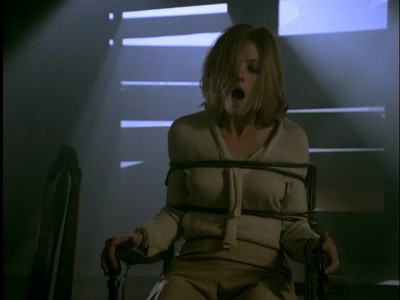
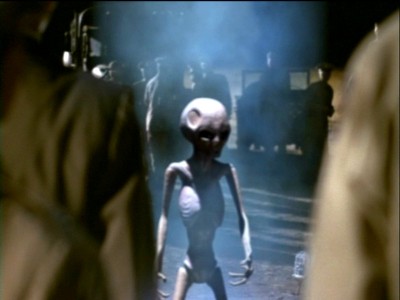
First and foremost, the show's fundamental (and dramatically solid) conflict between truth-teller John and secret-keeper Bach, is compromised by two big missteps: linking John's idealism to JFK's and the whole "Camelot" nonsense, and the casting of Eric Close as John. After the two-hour series pilot, when Robert Kennedy (James F. Kelly) pledges his full (covert) support of John and Kim's efforts at working against the Hive and Majestic, the myth that was "Camelot" is invoked as some kind of moral base line for the rest of the Dark Skies activities―a spurious conceit that didn't fool anyone in 1996, when the manufactured, phony mystique of the Kennedys had long since been exposed. It just isn't credible to watch a series that says, "the truth is overrated," and that postulates that everything we know in history books is a lie...before it goes and uses an equally false pop culture conceit as some kind of truth indicator. I was hopeful in episode six, Inhuman Nature, when the producers have RFK weaken, abandoning John when threatened with exposure over his (filmed) affair with Marilyn Monroe. Unfortunately, the producers right this "wrong" by having RFK, citing again his brother's unimpeachable honesty, regain his integrity and backbone in the final episode, casting the deciding vote to "fire" Bach from the head of Majestic. Think how much more impact the John character would have had, if John's belief in JFK and RFK had been destroyed like all the other "lies" of history, leaving him without ideals, without beliefs, stumbling in the dark while the Hive closed in on him.
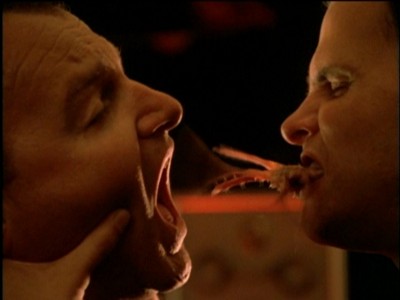
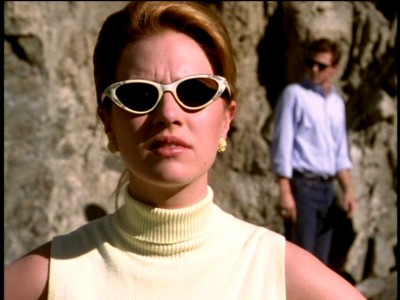
As for Close, a good actor who's only gotten better in the fifteen years since Dark Skies, he certainly fits the physical role of an idealistic Kenney booster; with his toothy grin and his thick hank of hair, he could be a Kennedy himself. However, that John disappears almost immediately in Dark Skies, to be replaced by an "obsessed" John whose paranoia rapidly spins out of control. That John, Close can't pull off here; he's just too even-tempered, too in control, too placid emotionally to convey a character going off the deep end. And that throws off the scenes with legendary J.T. Walsh, who smokes Close in their every encounter, as "everyone's favorite scumbag" Walsh slits his eyes and delivers one devastating retort after another to the blinking Close. If you listen carefully to the commentary track, one of the producers almost comes right out and admits that Close was chosen to satisfy NBC (darker, tougher Josh Brolin apparently was the first choice). That's a match-up I can see; as it is here, it doesn't play as well as it should. That's why it's such a relief when kick-ass Jeri Ryan shows up; no wonder she got the lion's share of attention from fans and critics when she was inserted mid-way into the series at the insistence of NBC, to perk up ratings. Close benefits somewhat from the series' turn towards action and sex (since when has Jeri Ryan's presence not boosted a show's eroticism level?), when he gets to shrug off the Camelot baggage and become more of a straight-forward espionage agent/solider (he moves and sounds right in the 'Nam actioner episode, White Rabbit). His chemistry with the soft, pretty Ward is good during the early Washington scenes (I'm not so sure Ward pulls off the evil Hive-infected Kim, though), but he's clearly enjoying hanging out with the sexy, tough Ryan later on (their Bloodlines episode is terrific, with Ryan and Close delightfully hippied-out for their final go-around). Luckily, the strength of the show's infectious (sorry) premise paves over any temporary potholes in the road when it comes to the individual performances.
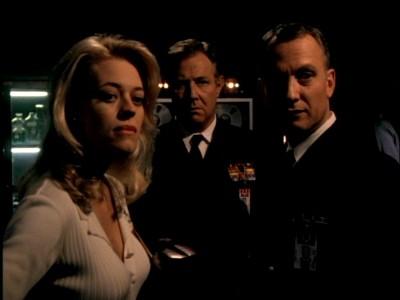
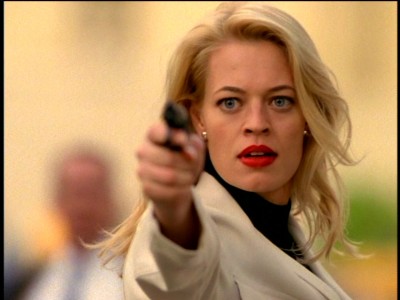
According to the producers, when it became known that the consistently low-rated series wouldn't continue on NBC, Dark Skies' production company suggested time-forwarding the series into the present-day (1997, that is), like the original Battlestar Galactica's second season, in an effort to save the show and find a new network. It's an intriguing idea, one that might have suited the performers better, and one that would have lowered costs significantly (since all that pitch-perfect 1960s period production design could be jettisoned). Come to think of it...couldn't that be done today with Dark Skies? After watching the extras here, it's obvious Close and Ward look remarkably unchanged after 15 years (Ryan doesn't show up in the bonuses, but we know she looks good), and someone could be found to step in for the late Walsh. With an increasing number of puzzling UFO sightings occurring now on a seemingly routine basis (and in front of thousands of urban witnesses, it seems), and interest in conspiracy theories unabated, maybe the time is right to bring back this clever gem.
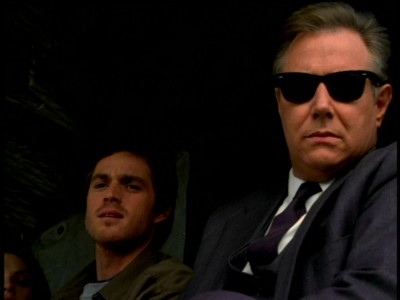
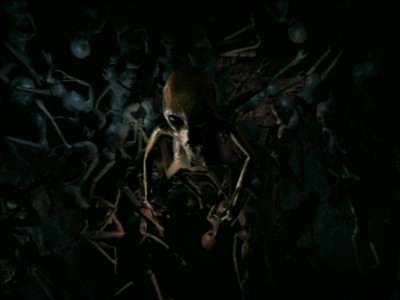
Here are the 19 episodes of the 6-disc set, Dark Skies: The Declassified Complete Series, as described on their slimcases:
DISC ONE
The Awakening (9/21/1996)
When congressional aide John Loengard is tasked with looking into the validity of an Air Force investigation of UFO sightings, he suddenly finds himself in the middle of a top-secret operation known as Project Majestic.
Moving Targets (9/28/1996)
In the aftermath of President Kennedy's assassination, John is locked in a race against Bach to recover the alien artifact he used to prove the existence of the alien invasion.
Mercury Rising (10/19/1996)
While Majestic prepares a probe intended to locate the Hive base, a haunting dream takes John and Kim in search of an astronaut Kim believes was with her during her abduction.
DISC TWO
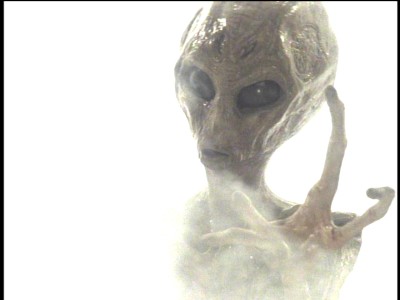
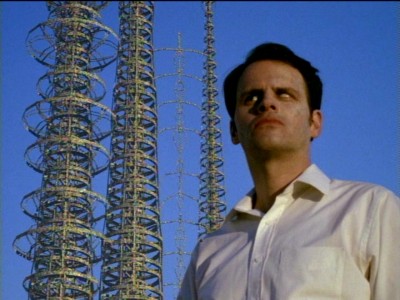
Dark Days Night (10/26/1996)
Intercepted radio transmissions lead John and Kim to suspect that an upcoming television appearance by a British rock band called The Beatles may be the site of a Hive operation.
Dreamland (11/2/1996)
John investigates the possibility of gamblers using telepathy to beat the odds in Vegas, while Kim learns of a Hive plot to use casino winnings to finance their operations.
Inhuman Nature (11/9/1996)
John and Kim travel to Wisconsin to look into a recent string of cattle mutilations and reports of strange lights in the sky.
Ancient Future (11/16/1996)
While investigating a series of mysterious magnetic disturbances in Alaska, John and Kim begin to suspect a local Tingit tribe of hiding an ancient Hive crashed ship.
DISC THREE
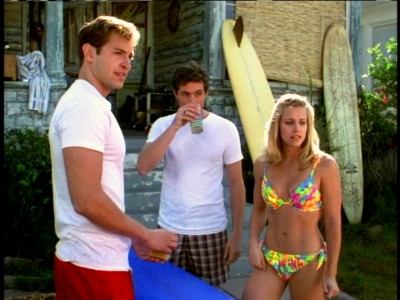
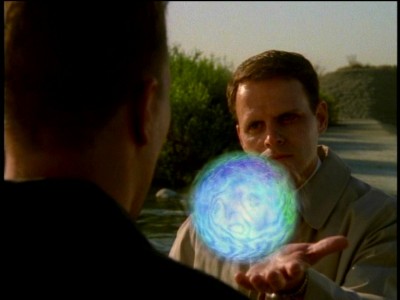
Hostile Convergence (12/7/1996)
Kim sneaks away to attend her sister's wedding in Denver but is shocked to discover her soon-to-be brother-in-law is actually a Majestic agent.
We Shall Overcome (12/14/1996)
The disappearance of three Civil Rights workers prompts an investigation in Meridian, Mississippi, where Kim feels the presence of the Hive.
The Last Wave (1/4/1997)
John and Kim take a trip to Los Angeles to mourn the death of an old friend. But when they arrive, they learn there's more to his apparent suicide than anyone first thought.
The Enemy Within (1/11/1997)
While John and Kim pay a visit to John's childhood home, Bach begins to suspect a Hive spy inside Majestic.
DISC FOUR
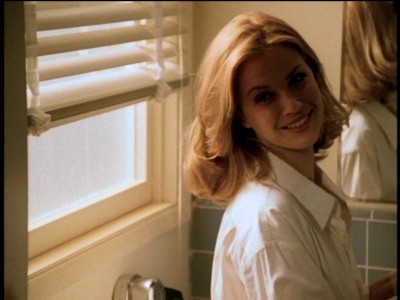
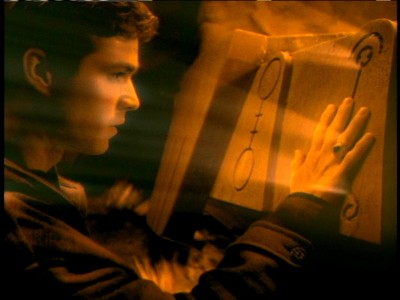
The Warren Omission (1/18/1997)
John's asked by Attorney General Robert F. Kennedy to testify before the Warren Commission, while Bach makes it his mission to discredit him.
White Rabbit (2/1/1997)
The United States finds itself at war in Vietnam after Bach convinces the country that the Soviets were firing on U.S. naval vessels instead of the Hive ship hovering over the Gulf of Tonkin.
Shades of Gray (2/8/1997)
When an attempt to lure and capture a Hive ship and its crew goes awry, John and Kim seek out a wounded Gray being aided by the daughter of a widowed farmer.
Burn, Baby, Burn (3/1/1997)
Bach sends Kim to a doctor in Los Angeles who works with pregnant Hive abductees, but when she and John arrive, they find themselves surrounded by race riots in Watts.
DISC FIVE
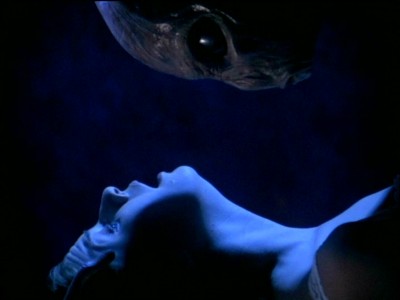
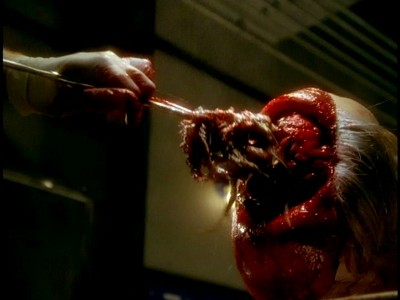
Both Sides Now (3/8/1997)
Completely unaware that he's being used by Bach to locate Kim for Majestic, John insists that he accompany Juliet on her trip to San Francisco.
To Prey in Darkness (3/15/1997)
Bach sends John to see Carl Hertzog, a former Majestic doctor, who denies any knowledge of the stolen footage of Truman's meeting with aliens.
Strangers in the Night (5/24/1997)
Bach assembles a team, including John, Juliet, and Major Colin Powell, to look into a mysterious message sent by the Soviets' Majestic counterpart, Aura-Z.
Bloodlines (5/31/1997)
With the aid of Dr. Timothy Leary, John and Juliet search for the San Francisco-based lab where the Hive has been producing hallucinogens. Meanwhile, Dr. Carl Sagan is assigned the task of decoding a message transmitted to Earth from space.
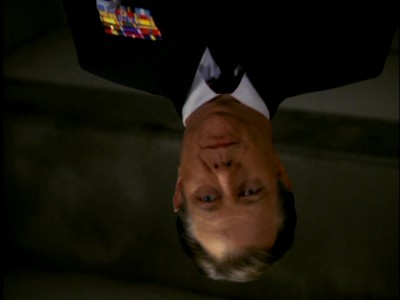
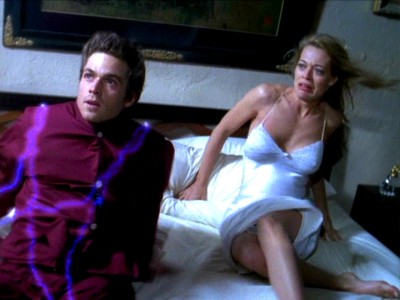
The DVD:
The Video:
Quite nice. The full-frame, 1.33:1 video transfers for Dark Skies: The Declassified Complete Series look solid, with correctly-valued color (the gauzy, hazy look is intended), with realistic skin tones and a sharp, sharp image. Blacks hold, and anomalies are slight (some scratches and dirt specks, but very few and far between). Some of those special effects may look dated...but that's part of the show's charm.
The Audio:
The Dolby Digital English 2.0 stereo audio track is surprisingly strong, with good, if infrequent, separation effects and a hefty recording level. Hiss is minimal. Unfortunately, no close-captions or subtitles are available.
The Extras:
Tons of extras. First, an enclosed 10-page booklet is included, written by Bryce Zabel, introducing the show in a cleverly-designed format that resembles a redacted government document ―the first indication, along with the time-line slimcase artwork, that Shout! put a lot of thought and effort into this set. Next, there are commentary tracks featuring Zabel, Friedman, Close and Ward, for the two-hour pilot, The Awakening, and the series' finale, Bloodlines. Crammed with lots of fascinating stories of the inception and production of the series, these are two of the happiest commentary tracks I've ever heard: clearly, these entertaining, well-spoken people enjoyed working together, and enjoyed getting back together and laughing about this fun series. On disc one, there's also an Easter egg that prompts you to insert the disc into your computer to access the original pilot script. On disc five, there are two Easter eggs. The Truth, running 15:54, where Friedman tells a story about a mysterious contact in the government who told him the "secret" of the universe, may be as fascinating as the entire series (Zabel is right; he's a hell of a storyteller). Future Seasons, running 6:58, has the producers discussing their aborted plans to continue the series' second season. On the bonus sixth disc, the International Pilot is included, running 90 minutes, and it makes for an equally compelling opening to the series (the cerebral extraction scene with G.D. Spradlin is horrifically more gory, while all the "Men in Black" appearances are fun ―NBC made the producers eliminate all the black suits in the film, in deference to the upcoming movie of the same name). Signal-To-Noise: Uncovering Dark Skies, running 54:33, is a three-part interview with the producers and the two lead performers, where they discuss the show's production and reception. The Dark Skies Glossary runs a healthy 23:04, where Zabel and Friedman explain the various terms of the show. Original Sales Presentation runs 3:36, still showing all the "Men in Black," while Original EPK runs 3:24. Original Network Promos run 4:26, while finally, the Season Two Proposal runs 2:51. That's a phenomenal amount of extras for a show few people have seen.
Final Thoughts:
Deliriously paranoid, and filled with enough conjecture and supposition for a hundred Geraldo specials, Dark Skies: The Declassified Complete Series should have been a rousing success for NBC back in 1996...if it had been on HBO. Unfortunately, a poor time slot and an unfair comparison to the better-rated The X-Files doomed this show from the start. Too bad, because it's a dizzy little thrill ride, with goofy conspiracy theories bumping up against gross-out alien infestation scenes every five minutes or so, all filtered through an alternative history lesson (...or is it?...) that should delight whack jobs like me who can't get enough of this stuff. Shout! Factory has outdone themselves with this extras-laden set, making Dark Skies: The Declassified Complete Series an absolute must-own title. I'm giving Dark Skies: The Declassified Complete Series our highest rating here at DVDTalk: the DVD Talk Collector Series award.
Paul Mavis is an internationally published film and television historian, a member of the Online Film Critics Society, and the author of The Espionage Filmography.


|
| Popular Reviews |
| Sponsored Links |
|
|
| Sponsored Links |
|
|
| Release List | Reviews | Shop | Newsletter | Forum | DVD Giveaways | Blu-Ray | Advertise |
|
Copyright 2024 DVDTalk.com All Rights Reserved. Legal Info, Privacy Policy, Terms of Use,
Manage Preferences,
Your Privacy Choices | |||||||













